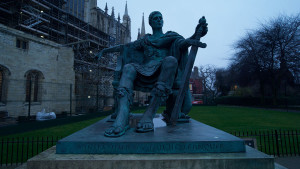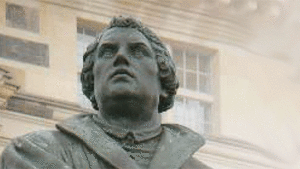One of the most widely read books from past centuries is Pilgrim’s Progress (1678), one of about 60 works by John Bunyan. William Carey became a founder of Protestant cross-cultural missions when he ventured from England to India in 1793. The preaching of Charles Spurgeon attracted so many Londoners that in the years 1859 to 1861, a tabernacle seating 6000 people was built to accommodate the crowds.
These are all significant features of Christian history, so what can all Christians learn from hosts of committed Baptists like Bunyan, Carey and Spurgeon?
Baptist origins
According to the Oxford Dictionary of the Christian Church, the Protestant Reformation is a “somewhat loose term” that “covers an involved series of changes” occurring in Western Christendom between the 14th and 17th centuries. Although the Reformation took so long to gather momentum and reach its climax, we commonly regard it as an event of the 16th century. The ideas and deeds of great leaders of this century leap from the pages of history, among them, Martin Luther in Germany, Ulrich Zwingli and John Calvin in Switzerland, and John Knox in Scotland. Often we label such stalwarts as “the magisterial reformers.” Far less is known about a host of others who also contributed much to the Reformation.
Even the Protestants in relatively isolated countries like Switzerland faced daunting problems. With Bibles newly available, more people were able to read and study the Word of God. The New Testament records calls to believe and repent—and then be baptised (see Acts 2:38; 8:12, plus other references). Slowly, the idea of believer’s baptism developed, much to the horror of those who felt they were correctly baptised as infants when a few drops of water were poured or sprinkled on their heads. How could communities of Christians remain united in the face of such seeming heresies?
Force seemed to provide the needed weapon. People baptised as unknowing infants wanted to be baptised a second time. An epithet was soon coined to describe such dissidents: Anabaptists or “rebaptisers.” The preposition ana (again) said it all: heretics were questioning the church’s authority to baptise infants and requiring the already-baptised to be baptised again. Bitter persecution developed.
According to Harold S Bender and C Henry Smith, “if the pagan persecution of the early church was severe, the persecution of the Anabaptist-Mennonites by the Catholic and Protestant state churches of the Reformation times was, in proportion to the numbers, still more severe.”
The ways some European countries dealt with Anabaptists seems bizarre from our perspective in the 21st century.
Many earnest Christians believed that if the Anabaptists wanted to be baptised again, it was quite in order to drown them. Thousands were held under water, bound hand and foot and thrown into deep water, burned at the stake, or beheaded. Historians describe the persecution that flourished in Switzerland from 1525 as continuing until 1614, although full toleration was not achieved there until 1815.
However, such persecution only drove the Anabaptists to their Bibles with increased ardour. What did the Scriptures really say? What did they actually mean? How should the teachings of God’s Word be faithfully applied?
The topics were many and the questions were legion. Insofar as baptism was concerned, the picture became clear over time: early Christian leaders baptised individuals who believed in Christ and repented of their sins.
So the Anabaptists—for whom truth was more precious than life itself—can be credited with helping Christianity rediscover “believer’s baptism.”
collective memory and advancing truth
Persecution failed to crush Anabaptist convictions. Slowly the Ana part of their name fell into disuse; some Anabaptists who had not been baptised as infants would become known simply as Baptists, although others— like the Mennonites—adopted other titles derived from the names of various leaders.
But, as time went by, there seemed to be a need to progress even further by recovering the biblical mode of baptism.
The story of John the Baptist implies he needed “plenty of water”
to baptise people (see John 3:23). At His baptism, Jesus “went up out of the water,” inferring He had been in the water (see Matthew 3:16). The Ethiopian and Philip “went down into the water” so Philip could baptise the new African believer, then both of them “came up out of the water” (see Acts 8:36-39). Such narratives seem to carry the same meaning as the Greek word used by the writers of the New Testament: to baptise meant to “dip, wash, plunge or immerse.”
As a community of believers, Baptists became noteworthy for their commitment to Scripture as their sole rule of faith and practice. Forgotten truths they rediscovered seemed startlingly new to many, such as what the Bible says about baptism. The apostle Paul presents baptism as a burial (see Romans 6:1-4; Colossians 2:12); such a symbol didn’t seem to imply pouring a small amount of water or sprinkling a few drops of water on an infant’s head. Baptists came to believe that to be true to the Bible, they must practice believer’s baptism by total immersion, re-enacting the death, burial and resurrection of Jesus.
Yet such beliefs and practices focused attention on the huge problem of unity.
Following on from the Reformation, there were some dreadful wars. Those who ardently believed there must be unity of faith and practice among all Christians were prepared to force others to surrender their convictions. Some thought secular rulers should decide on matters of faith and their citizens should follow them. Or perhaps it may help to have Catholic regions where Catholic rulers and citizens would get along, and other areas for Protestant princes and people to do likewise.
What, then, would be done with the more radical reformers who wanted to follow the Bible fully?
Which brings us to the later experience of people like John Bunyan in England, whose growing awareness of the Bible meant he spent most of the years between 1660 and 1672 in a Bedford prison. Why? Because Bunyan was an Independent, not a member of the established church. From a host of such difficult experiences with secular authority, Baptists slowly hammered out another core principle: that church and state are best kept separate, embodied in their catch-cry, “A free church in a free state.” Probably more that any other religious group, Baptists are to be thanked for the constitutions of countries like the United States, Australia and New Zealand guaranteeing freedom of religion.
Baptists and many others still cherish Bunyan’s vivid writings on Christian themes, like Grace Abounding to the Chief of Sinners (1666) as well as The Pilgrim’s Progress, for which he wrote a second part in 1684. No wonder the Baptist communion, with its focus on the Bible, developed missionaries like Carey and preachers like Spurgeon, who drew multitudes to hear the good news of God’s grace in Jesus Christ.
Seventh Day Baptists
Another biblical teaching that some Baptists came to emphasise has influenced millions of other believers: the idea that the example of Jesus and the teachings of the apostles call Christians to worship and rest on the seventh day of the week.
As Baptists were searching their Bibles to discover all the truths contained therein, some of them read again and again the fourth of the Ten Commandments: “Remember the Sabbath day by keeping it holy. Six days you shall labour and do all your work, but the seventh day is a Sabbath to the Lord your God. On it you shall not do any work... . For in six days the Lord made the heavens and the earth, the sea, and all that is in them, but he rested on the seventh day. Therefore the Lord blessed the Sabbath day and made it holy” (Exodus 20:8-11).
Such searchers came to believe Genesis 2:1-3 indicates that the Sabbath was given to our first parents in Eden, before the entry of sin, so it could not be one of the Jewish ceremonies nailed to the cross of Christ. Nowhere could they find any indication that Jesus or the apostles either abolished the Sabbath or established worship on Sunday.
Instead, they kept the same day as the rest of the Jews. However, Christ observed the Sabbath in the way God intended, freed from the barnacles of tradition that made it so burdensome.
So by 1653, there was a small congregation of Seventh Day Baptists meeting in London, under the leadership of Dr Peter Chamberlen. A mere two decades later, similar groups were gathering in North America.
fast-forward to the 19th century
Near the end of the Second Great Awakening in the United States, Seventh Day Baptists were praying that God would help them more effectively share their convictions about the Sabbath with other Christians.
One of their members, Rachel Oakes, attended a Communion service and heard a Methodist minister, the Reverend Frederick Wheeler, call for obedience to the law of God.
When Wheeler visited Mrs Oakes during the following week, she confided to him her conviction that Christians were called to keep all 10 of God’s commandments.
The minister was astonished. But, when he looked more carefully at his Bible, he came to the same conclusion— and began keeping Saturday as the Sabbath.
Currently there is a plaque outside a white church in Washington, New Hampshire, that states (in part): “In the adventist movement of 1842 and 1843 the members of this ‘christian society’ espoused the advent hope. Shortly thereafter, Rachel Oakes, a seventhday Baptist, moved to the community, worshiped with the adventists and distributed tracts on the importance of keeping the seventh day as the Sabbath.
The result was that on a Sunday morning in the autumn of 1844 William Farnsworth arose in the congregation and stated that he intended to observe the seventh- day Sabbath. His wife, his brother Cyrus, and about a dozen others joined him.
All were disfellowshiped for their stand.”
Even so, the earnest study of the Scriptures led others to follow the example of Rachel Oakes (later, Preston) and the members of the Christian Society in Washington, New Hampshire.
Baptists in the 21st century
According to the World Christian Encyclopedia, there were 52 million people in the Baptist World Alliance by the dawn of the 21st century. While their specific denominational names are diverse, their heritage of faith calls us all to search the Scriptures that we might better learn the will of God. Grace and law go beautifully together. There is no conflict between faith and obedience. As James H Sammis wrote in a well-known hymn: “When we walk with the Lord / in the light of His Word, / What a glory He sheds on our way! / While we do His good will, / He abides with us still, / And with all who will trust and obey. / Trust and obey, for there’s no other way / To be happy in Jesus, / But to trust and obey.”
We should all thank God for the challenges of faith we encounter from the study of Baptist history!







